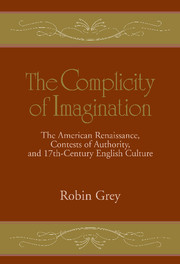 The Complicity of Imagination
The Complicity of Imagination Book contents
- Frontmatter
- Contents
- Acknowledgments
- Cambridge studies in American Literature and Culture
- Introduction: Antebellum America and the Culture of Seventeenth-Century England
- 1 Cultural Predicaments and Authorial Responses
- 2 “A Seraph's Elequence” Emerson's Inspired Language and Milton's Apocalyptic Prose
- 3 Margaret Fuller's “The Two Herberts,” Emerson, and the Disavowal of Sequestered Virtue
- 4 “As if a green bough were laid across the page”: Thoreau's Seventeenth-Century Landscapes and Extravagant Personae
- 5 Melville's Mardi and Moby-Dick, Marvelous Travel Narratives, and Seventeenth-Century Methods of Inquiry
- 6 Surmising the Infidel: Melville Reads Milton
- Notes
- Index
- Cambridge Cultural Social Studies
4 - “As if a green bough were laid across the page”: Thoreau's Seventeenth-Century Landscapes and Extravagant Personae
Published online by Cambridge University Press: 05 November 2009
- Frontmatter
- Contents
- Acknowledgments
- Cambridge studies in American Literature and Culture
- Introduction: Antebellum America and the Culture of Seventeenth-Century England
- 1 Cultural Predicaments and Authorial Responses
- 2 “A Seraph's Elequence” Emerson's Inspired Language and Milton's Apocalyptic Prose
- 3 Margaret Fuller's “The Two Herberts,” Emerson, and the Disavowal of Sequestered Virtue
- 4 “As if a green bough were laid across the page”: Thoreau's Seventeenth-Century Landscapes and Extravagant Personae
- 5 Melville's Mardi and Moby-Dick, Marvelous Travel Narratives, and Seventeenth-Century Methods of Inquiry
- 6 Surmising the Infidel: Melville Reads Milton
- Notes
- Index
- Cambridge Cultural Social Studies
Summary
All the distinguished writers of that [Renaissance] period, possess a greater vigor and naturalness than the more modern … and when we read a quotation from one of them in the midst of a modern author, we seem to have come suddenly upon a greener ground, a greater depth and strength of soil. It is as if a green bough were laid across the page, and we are refreshed as by the sight of fresh grass in mid-winter or early spring.
Thoreau, “Sunday,” A Week on the Concord and Merrimack RiversAs readers of Thoreau's Walden and A Week on the Concord and Merrimack Rivers, we respond most immediately to his engagement with the sensuous particularity of the New England landscape, to his recuperation of an earlier linguistic vitality, and to his presentation of a coherent, purposeful, and mystically suffused world. We tend to forget that his newly created landscape is just that – an invention of his own imagination that frequently comes before us at the expense of the actual New England landscape. If we lose sight of Thoreau's active hostility towards institutionalized religion as well as toward the conventions of American law, government, and society, and if we overlook the high degree of literary allusiveness in his texts, we are apt to forget that the landscapes he presents are often highly artificial ones. For all the individualizing descriptive nuances Thoreau records of the Concord and Merrimack rivers, for all the features of the particular scenes of Walden Pond he conveys, the actual landscapes often disappear to be replaced by a montage of literary ones.
- Type
- Chapter
- Information
- The Complicity of ImaginationThe American Renaissance, Contests of Authority, and Seventeenth-Century English Culture, pp. 107 - 148Publisher: Cambridge University PressPrint publication year: 1997


